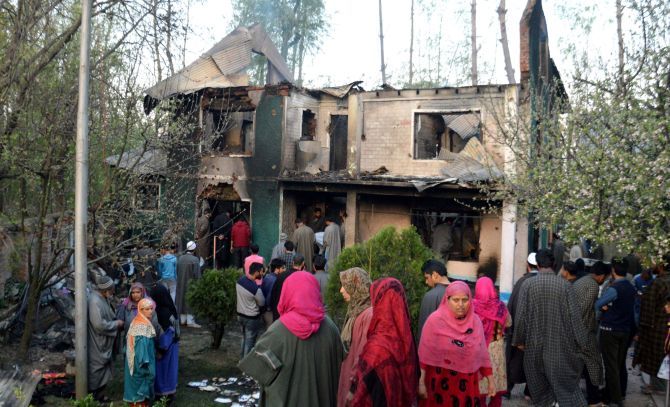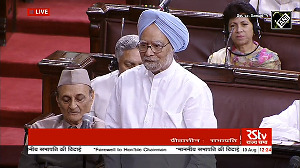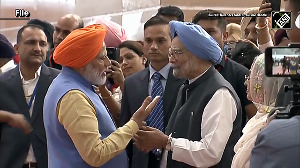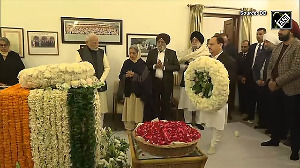He asserted his force was as competent as the CBI to probe the Kathua rape and murder case.

Encounter sites are are not the venue of 'marriages of terrorists' to be flocked by youngsters as bullets do not differentiate between stone pelters and terrorists, Jammu and Kashmir police chief S P Vaid said on Thursday as he asserted his force was as competent as the Central Bureau of Investigation to probe the Kathua rape and murder case.
In a first, the state Director General of Police took to micro-blogging site Twitter to participate in a live broadcast where he took questions directly from people ranging from issues like the Kashmir problem, Islamic State terror group, human rights violations to educated youth joining terrorists and disruption of work in educational institutions.
Asked why the rape and murder case of an eight-year-old girl in Kathua district in January was not transferred to CBI, he said, "We have no objection but the police is as competent as anybody else."
"If we can we fight terrorism and stone pelting, why we can't carry out the professional investigation. Our officers are on deputation with CBI," Vaid said expressing confidence in his crime branch team that investigated the case and arrested eight persons.
He termed it a “misconception” that only officers from Kashmir were part of the special investigation team.
"The SIT had officers from all ranks and regions. A police officer is a police officer and not a Muslim, Hindu, Sikh or Christian. That is what we believe in," he said adding that it was a misconception that no officer from Jammu area was part of the team.
Naming two of the officers, he said Senior Superintendent of Police, Jammu, Ramesh Jhalla and Deputy Superintendent of Police, S Sharma, were actively involved in the case.
Some Pakistani handlers also appeared to be asking questions during the interaction.
Vaid also asserted that the gun and violence were no solution to the Kashmir problem and favoured a dialogue between the concerned parties for a peaceful resolution of the Kashmir issue.
"I wish the Kashmir problem to be so simple that I could answer it in one reply. So many players are working for decades to find out a solution to Kashmir. But this is not a simple thing. Personally I feel the gun is not the solution,” the police chief said in reply to a query.
Let every party concerned including 'our neighbour' (Pakistan) understand that the only way out is to sit together, talk and sort out the problem, he said.
The DGP reiterated his appeal to the youth not to come close to encounter sites.
"Let me tell you that no citizen of India would like any civilian killing. We have been repeatedly requesting people not to come near the encounter sites," he said.
He said when bullets fly, whether from the militants, army, paramilitary forces or the police's side, they do it in a trajectory.
"They will not look for a chest of a particular person; it can hit anybody. It is not advisable to come near the encounter sites,” he said adding that it pained him and the forces most if a civilian died.
Civilians, he, however, insisted have no business to be present at encounter sites.
"Marriage of the militants is not going on that these boys are coming near the encounter sites,” he said.
Vaid said he does not favour snapping of internet to maintain law and order in the valley but is forced to take such a decision.
"I am absolutely against snapping of internet. However, the problem is that some mischievous elements resort to misuse of it and spread hatred, false propaganda and even instigate young boys," he said.
He said police was working on various methods to ensure minimum civilian casualties and minimum disruption of work in education institutions besides keeping away educated youth from joining terror ranks.
Referring to the killing of Hizbul Mujahideen terrorist Burhan Wani and subsequent protests, he said it was the most challenging task of his career. "Post Burhan situation when I was given the charge as special DGP law and order was the most challenging task," he said.
Asked why police did not take action against Army personnel, he said cases were registered whenever incidents of human rights violations came to notice.
"Army has protection under AFSPA and before starting any criminal proceeding, the sanction of government of India is required under the law of the land. Police since 1990's registered cases where such incidents have happened and come to our notice. We have been taking up with government," he said.
On the presence of terror group Islamic State in Kashmir, he said ISIS is basically a thought and a radical idea adding 'I wish it doesn't come here'.
He agreed with a questioner that national media was not playing a constructive role about the situation in Kashmir.
"National media is not playing a very constructive role and efforts are on to counsel them along with the local media not to hurt the sentiments of Kashmiri people,” he said.
He said the amnesty given to 'first time stone-pelters stands and anyone can even approach now'.
He ruled out the use of chemical weapons against holed up militants during operations and said 'no human force can think of it. These rumours are set from Pakistan'.
He termed as frivolous the charges that the youth of interior Srinagar were being harassed by police on the pretext of being stone pelters and hefty amounts of money were being taken from them.
"I have also come across such complaints which mostly are frivolous. If there is any genuine complaint let the person come forward, we will take strict action," he said.











 © 2024 Rediff.com -
© 2024 Rediff.com -